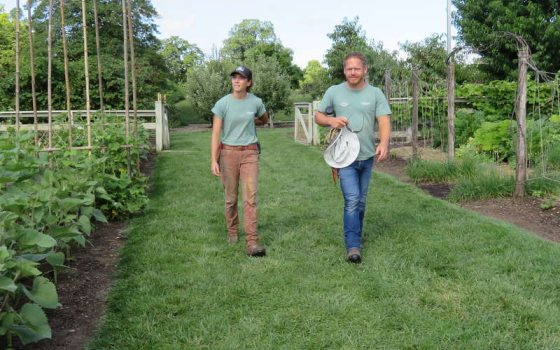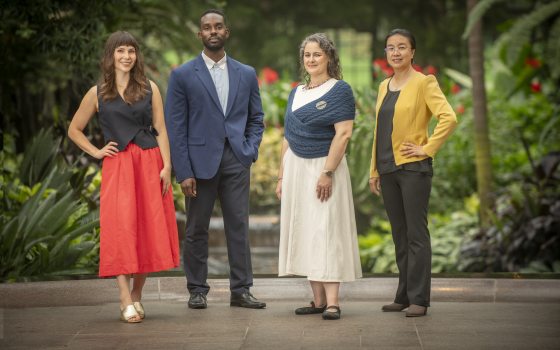Our tuition-free Professional Horticulture Program is as unique—and inspirational—as its students. Combining practical experience, coursework, hands-on projects, and study abroad travel, the two-year immersive program prepares students of varied interests and ages—high schoolers to career changers—for careers in horticulture through fun, active learning.
Formerly known as the Professional Gardener Program, Longwood’s Professional Horticulture Program represents much more than a name change. Following a full year of researching and collecting data from those directly impacted by the program, including instructors, alumni, staff, and current students, we have adapted the Professional Horticulture Program into a more personalized program with enhanced practical application ... keeping in line with Longwood’s commitment to offering world-class learning opportunities.
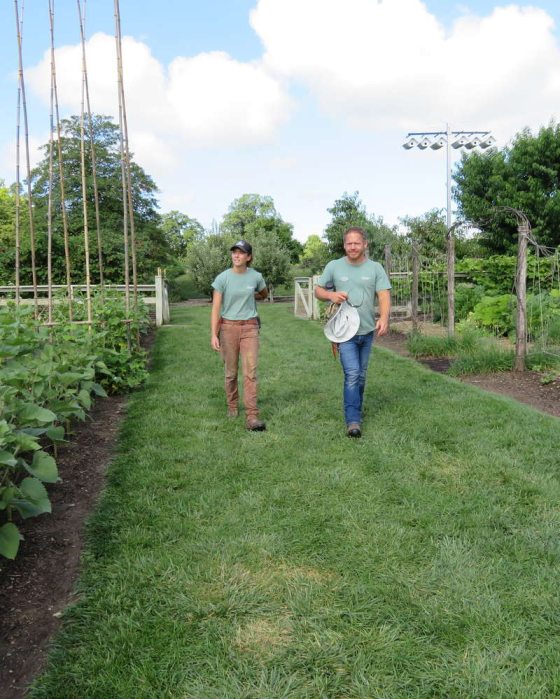
Students Amy Barker and Joshua Shepherd walk through the Idea Garden, among produce grown and sold as part of the program’s Veggie Venture. Photo by Fred Zwiebel.
One of the most exciting parts about the program is giving students the opportunity to learn alongside our expert staff while growing their own professional and personal selves. We place a special focus on personal growth and foster that growth throughout the program. Students will now enjoy more frequent hands-on work in our Gardens, enjoy invaluable classroom instruction to maximize their areas of specialty, and tailor the program to fit their needs. During the last four months of the program, students are now able to choose where in the Gardens they want to learn, work, and specialize to gain even more practical experience.
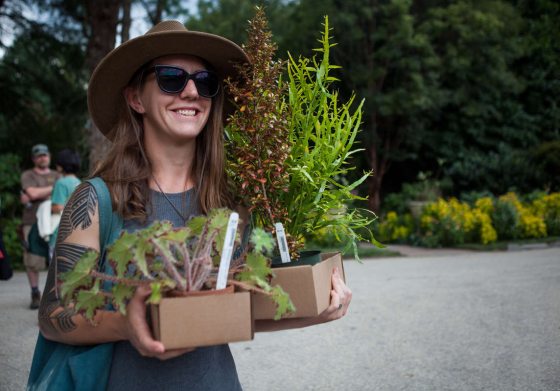
Program student Ashley Jones engages in one of many student activities, with this one at Meadowbrook Farm in Jenkintown, PA. Photo by Morgan Horell.
During the program, students have an amazing opportunity to truly build a network with one another, with Longwood staff, with regional organizations from nurseries to cultural institutions, and with global organizations during the study abroad component. The experience is truly immersive, as students live rent-free on Longwood grounds while engaging in such special projects as designing and maintaining Longwood’s Student Exhibition Garden, as well as experiencing real-world produce production, marketing, and grading for a Certified Green Restaurant through our Veggie Venture with Longwood’s Terrace Restaurant. Following the program, students are able to transfer their Professional Horticulture Program coursework and continue studying toward a bachelor’s degree through our articulation agreements or can apply their experience to a horticulture career.
Perhaps the best way to illustrate the richness of our Professional Horticulture Program is with a look at two program alumni who now lend their horticultural expertise as Longwood staff. Longwood Associate Director, Landscape Architecture and Program Design Erin Feeney and Senior Horticulturist Michael Strengari, both graduates of the program, first came to Longwood as students with very different backgrounds ... and completed the program with inspiring results.
Feeney was working as a landscape architect in Chicago in 2009 when she decided to apply for the program. Working mostly on green roof and city plaza projects for urbanites, Feeney wanted to know more about plants and gain more practical, hands-on experience, and had heard of Longwood through family members who lived in the area. “As a landscape architect I was motivated to connect people and plants and was doing so through design,” Feeney shares. “As I worked my way through the program, I came upon this incredible realization that public horticulture could make the connection between people and plants in such a beautiful way, and that public horticulture as a whole was meeting the goals I had been working toward as a designer.” While Feeney has always been interested in such topics as biology, as evidenced by the number of biology classes she took in high school and college, she notes that she “could look at those topics with fresh eyes during the program, because being here was so different than being in just a classroom. I could appreciate it so much more being surrounded by it here at Longwood.”
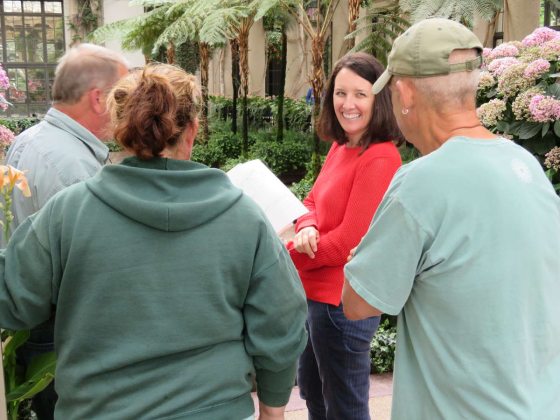
Erin Feeney (center) reviews an upcoming Exhibition Hall display design with fellow Longwood staff. Photo by Fred Zwiebel.
After Feeney graduated from the program in 2011, she was offered a contract position at Longwood, which then evolved into a full-time position. Today, Feeney focuses a large portion of her “ever evolving, always interesting” position at Longwood in overseeing large-scale installations from luminary displays to special exhibitions, as well as in the development, implementation, and interpretation of new programming and events. “The program really helped me navigate the complexity of a public horticulture organization,” Feeney shares. “Learning the different facets of horticulture is helpful in so many ways. There are so many different languages to speak when it comes to horticulture, but the program gave me the ability to communicate intelligently throughout the field.”
For Strengari, his involvement in the program represented a big career change. After majoring in psychology and working in schools for a few years, Strengari needed a change. “I didn’t realize horticulture was a career until I was in my 20s,” Strengari shares. Leveraging his new-found realization, lifelong interest in plants, and his years working at garden centers growing up, Strengari applied for the program and started in 2012. “The very best thing about the program, to me, was finding a community that had the same interests as me,” Strengari notes. “My cohort ranged from an 18-year-old student to a 60-year-old student, which made the community experience even more valuable.”
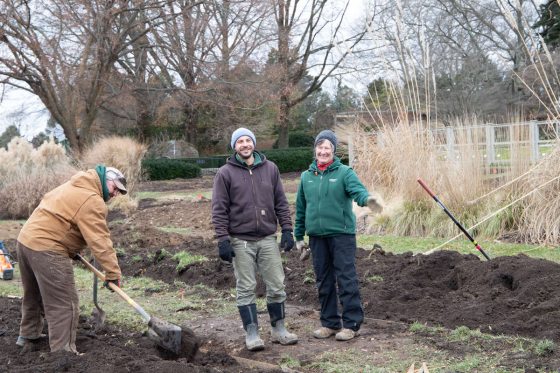
Michael Strengari, center, in Longwood’s Trial Garden, which he now manages. Photo by Bob Doerr.
After graduating from the program in 2014, Strengari worked with an arts organization with a small horticultural staff for a number of years. During his time there, he found himself utilizing a variety of skills he had learned during the program … including some that took him by surprise. “Without the program, I would have never taken a turf management class, but I’m so glad I did as suddenly I found myself in a position where I had to manage 20 acres of turf. I had to write a contract for that work, oversee the care of the turf, and more,” he shares. “I picked up so much that I would have never been exposed to in a traditional setting or classroom. The true strength of the program was combining classroom with training at the same time. You build your skills and apply them.”
While Strengari enjoyed his position at the arts organization immensely, when his current position opened up at Longwood, he jumped on it. “This is where I grew up and I always wanted to be here,” shares Strengari. Today, you can most often find him managing Longwood’s Perennial Border, Trial Garden, and Outdoor Children’s Garden, as well as working with program students among many other projects. Strengari is also on his second year of serving as president of Longwood’s Professional Gardener Alumni Association, which keeps program alumni connected through community outreach and other exciting initiatives.
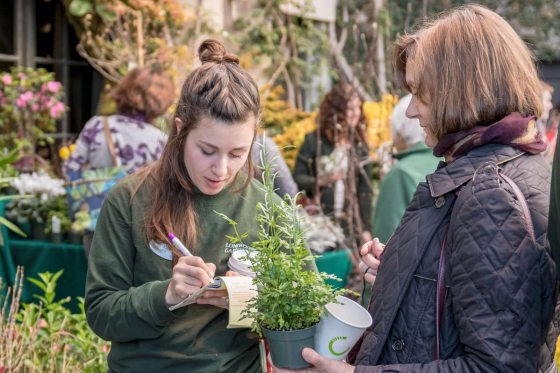
Students take part in the plant sale for the Today’s Horticulture Symposium, a daylong symposium hosted by the Professional Gardener Alumni Association. Proceeds from the sale go towards the students’ study abroad travels. Photo by Gene McCutchen.
Feeney and Strengari’s advice to those considering applying for the Professional Horticulture Program? Strengari notes that it’s important to realize that the program is “not a solo journey. It’s a wonderful opportunity to work as a team and grow together.” Feeney adds that the program is “incredibly open to personal interests. Know that you have flexibility in the program and make it your own. Simply put, apply and stick with it.”
And we’re so glad they did.
Interested in becoming part of the next Professional Horticulture Program cohort? Applications are due May 15, 2019, followed by interviews in June. The cohort will begin their Professional Horticulture Program experience this August.
